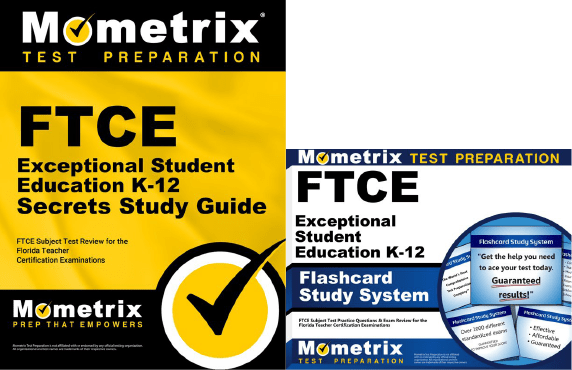If you need help studying for the FTCE Exceptional Student Education K-12 test or just want some more information about what the test is like, you’ve come to the right place!
Click below to take a free FTCE Exceptional Student Education K-12 practice test!
What’s on the Test?
The FTCE Exceptional Student Education K-12 test contains 80 multiple-choice questions and is timed at 2.5 hours.
The exam is split into six competencies:
1. Knowledge of Foundations of Exceptional Student Education
23% of the exam
- State and federal legislation that govern the education of students with exceptionalities
- Characteristics of students with exceptionalities
- Common typical and atypical development of various stages of student development
- Provision of education for students with exceptionalities based on legal and ethical standards
- Developing IEPs and transition IEPs
- Effective methods of communication, collaboration, and consultation with students, caregivers, parents/guardians, and all other stakeholders
- Effective methods of coaching and supporting paraprofessionals, volunteers, and tutors
- Factors associated with disproportionality in exceptional student education
2. Knowledge of Assessment and Evaluation
13% of the exam
- Characteristics and purposes of different types of assessments
- Legal requirements and ethical principles regarding assessment of students with exceptionalities
- Measurement concepts, characteristics, and uses of norm-referenced and criterion-referenced assessments for students with exceptionalities
- Purposes and requirements for participation of students with disabilities in the statewide assessment program
- Addressing specific needs of students with exceptionalities
- Identifying student needs and evaluating student progress across settings
3. Knowledge of Instructional Practices in Exceptional Student Education
21% of the exam
- Reliable sources of evidence-based instructional practices and interventions
- Appropriate instructional approaches, strategies, and materials based on assessments of the student’s educational needs
- Promoting students’ generalization of knowledge and skills across content areas, curriculum, and settings
- Characteristics and purposes of the core curriculum, supplemental programs, and intensive interventions as they relate to English language arts
- Differentiating, accommodating, and modifying classroom instruction
- Flexible grouping strategies for specific instructional activities with individual students with exceptionalities
- Selecting and utilizing print and nonprint media for instructional use
- Characteristics of specialized instructional approaches for students with significant disabilities
4. Knowledge of Positive Behavioral Interventions and Supports
12% of the exam
- Appropriate prevention and intensive intervention strategies for students who display challenging behaviors
- Concepts and models of positive behavioral interventions and supports
- Legal and ethical issues pertaining to positive behavioral interventions and supports and disciplinary procedures for students with exceptionalities
- Interventions that increase positive behavior
- Interpreting the essential elements of a functional behavior assessment
5. Knowledge of Multiple Literacies and Communication Skills
21% of the exam
- Standards-based language development skills and the components of language structure
- Characteristics of communication disorders and their impact on academic achievement and functional skills
- Assistive technology and alternative communication systems to facilitate communication across all educational settings
- The sequence of reading development and the critical components of reading proficiency
- Specialized instructional strategies and techniques to address deficits in phonological processing
- Instructional methods for increasing reading proficiency in phonics, word recognition, and fluency
- Instructional methods for increasing literacy across content areas
- strategies for facilitating students’ critical-thinking, executive functioning, and metacognition skills
- Instructional methods and supports for teaching writing foundations, the writing process, and purposes of writing
- Instructional methods for increasing mathematical skills across content areas
6. Knowledge of The Transition Process
10% of the exam
- Appropriate programs for transition to academic, technical, and career education and development
- Appropriate planning strategies to assist students, parents or guardians, caregivers, and stakeholders in developing postsecondary education and career goals for postschool outcomes
- Instructional approaches to assist students with exceptionalities to engage in self- determination and self-advocacy practices
- Resources and strategies that can assist individual students with exceptionalities to function independently in postsecondary education, home and community living, and employment
How to Register
To get started with the registration process, you’ll need to create an FTCE/FELE account on their website. You can then register for the exam via your account.
How the Exam is Scored
The FTCE Exceptional Student Education K-12 test is scored using a scaled scoring method. Here’s how it works:
For every question you answer correctly, you get one point added to your raw score. At the end of the test, your final raw score will be converted to a scaled score.
The reason your raw score is converted to a scaled score is because everyone that takes the test is given a slightly different set of questions. Since everyone has a different arrangement of questions, and because some questions are harder than others, converting your raw score to a scaled score ensures a more even playing field.
FAQs
How many questions are on the FTCE Exceptional Student Education K-12 test?
The test contains 80 questions.
What is the time limit for the FTCE Exceptional Student Education K-12 test?
The test is timed at 2.5 hours.
What is the passing score for the FTCE Exceptional Student Education K-12 test?
You’ll need a final score of at least 200 to pass.
How much does the FTCE Exceptional Student Education K-12 test cost?
The testing fee is $150.
Mometrix Test Preparation is not affiliated with or endorsed by any official testing organization. All organizational and test names are trademarks of their respective owners.



 FTCE Study Guide
FTCE Study Guide FTCE Flashcards
FTCE Flashcards